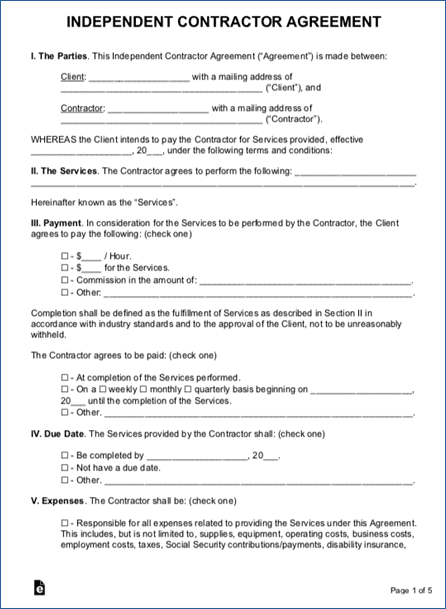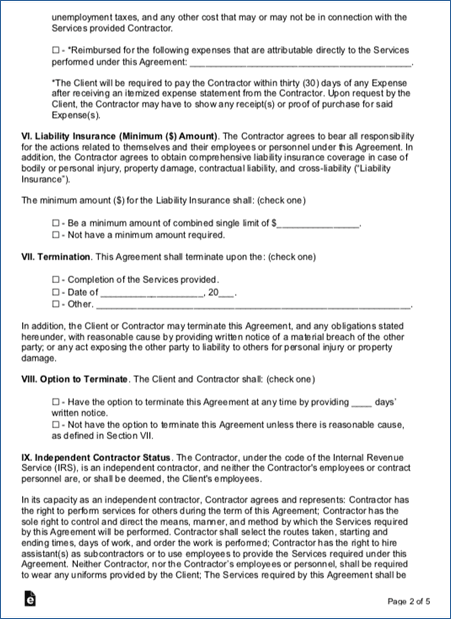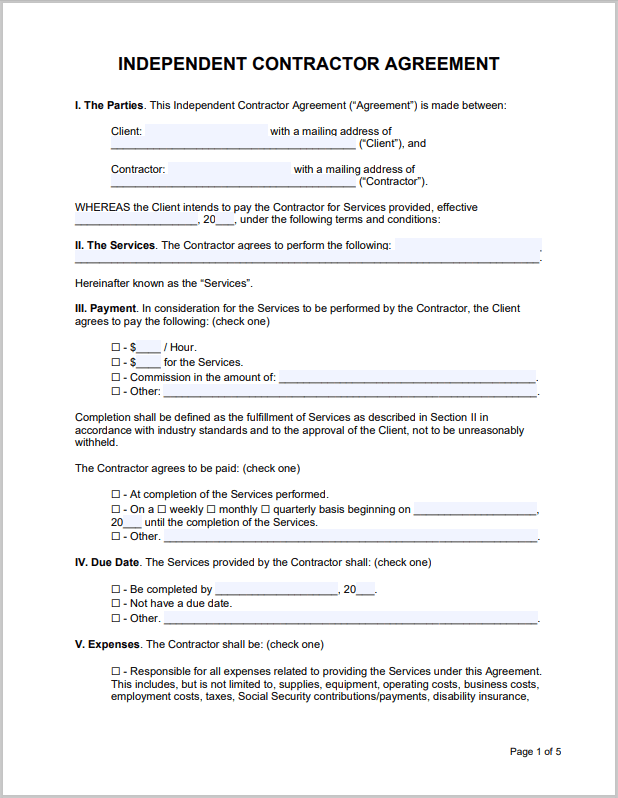Explaining What an Independent Contractor Agreement is
A legal agreement is always a good idea for most projects that involve the exchange of money. It is a means of protecting all parties involved. It is especially true in the case of freelance work. Freelancers should make sure that there is an Independent Contractor Agreement in place. One should, however, look at what an independent contractor is.
What is an Independent Contractor?
One of the perks of using an independent contractor is that they can save you money but still provide high quality work. An independent contractor is anyone who is able to provide a service. The individual, or individuals, would be independent of your business. That means that they are not a part of your staff.
An independent contractor works for someone who is not an employer. Even so, the contractor has to have their own business and perform all work under that umbrella. The individual is, therefore, in control of his or her own business.
A further aspect is that the individual would be regarded as being self-employed. Therefore, in order to protect their own business, they should ensure that they draw up an Independent Contractor Agreement.
What is an Independent Contractor Agreement?
An Independent Contractor Agreement is a legal document between the contractor (freelancer) and the prospective client. This is a document that needs to be drawn up and signed by both the client and the contractor before any work is started. The document will outline several matters, such as:
- The scope of the project. The scope of work will outline all that is required for a particular project. It will provide the following: an overview of the project, deliverables, a statement of intent, a summary, as well as the management of the project.
- It will include the payment schedule, which is the breakdown of the deliverables that could be paid in the form of milestones.
- Both the deliverables and the payment schedule will be part of the timelines provided beforehand. These are also seen as pre-set deadlines.
The independent contractor agreement template will make it easy for the contractor to complete all the details. It is important for both the contractor and the client to agree to the terms and then sign the document to make it legally binding. It is, therefore, a document that would outline the full relationship between the company hiring and the contractor hired to do the work.
The Difference between an Independent Contractor Agreement and an Employment Contract
An independent contractor agreement would specify services and projects, timelines, as well as what the final outcome would be. The agreement would, therefore, give specifics such as due dates and deliverables. The client and the independent contractor both sign the contract.
Most employment contracts can be a simple handshake or a signed document. This can be an implied, oral, or written agreement. If it is a written agreement, the employment contract is a document that the employee and the employer sign.
A further distinction between an independent contractor agreement and an employment contract is that the employment contract can be divided into various contracts. The independent contractor agreement is a once-off contract that is drawn up per project. Employment contracts are often permanent but can also be fixed-term contracts, or casual employment, to name a few.
The Importance of an Independent Contractor Agreement
An Independent Contractor Agreement is the best practice for any freelancer, as this will protect you should any disputes arise. It will also help you to lay out the project to reflect the goals and to set out clear expectations.
An independent contractor or freelancer should always provide a contract to a client for any work performed. This is vital, as the freelancer needs to show the client how the project will be completed. It will also include all agreements the client will make with the freelancer.
It is important to know that legal contracts can be cumbersome, but making use of an independent contractor agreement template will make it much easier. However, some online sites can also assist when it comes to filling in their templates. However, some online sites can be of service when it comes to filling in their templates.
Why Would You Need to Complete an Independent Contractor Agreement?
The independent contractor agreement template will guide the freelancer or independent contractor to fill out the project details to cover all bases. The reason why a contractor would need to create a contract agreement is the following:
- It is important to lay out what the parameters and expectations of the project would be. The aspects of this include:
- The nature as well as the scope of the work that would be completed.
- The determination of what and how compensation will be made.
- What the expected workflow will involve and where it would lead.
- How relationships will work in terms of communication and who the point of contact or contacts will be.
- Proprietary rights are important as these would establish ownership of any products emanating from a particular project. This is important, especially whenever intellectual property is an issue. The independent contractor agreement will, therefore, be necessary to establish because:
- The ownership of any work produced for the client in a given project is important to protect. In most instances, the client becomes the owner of the copyright, for example.
- The contractor would often retain the right to actively protect any trade secrets.
- Non-disclosure agreements are important especially to protect the confidentiality of business information.
- The independent contractor agreement would protect both parties should legal disputes arise. It will also include the reasons for the termination of the contract, should that occur.
Creating an Independent Contractor Agreement
The best way to create an independent contractor agreement is to make use of an independent contractor agreement template. The template would guide you to fill in all the details that are required for a contract with an independent contractor. Following here is a list of what should be included in an independent contractor agreement. The list is extracted from an independent contractor agreement sample. Some of the contents were also mentioned before:
- What services would the contractor provide?
- The compensation for the projects
- The due date for projects
- The expenses, if the contractor is responsible for any
- Liability insurance is included
- The option to terminate the contract
- The independent contractor’s IRS status
- Licenses, permits, and any certificates
- Federal and state taxes
- The benefits of the contractor’s employees
- The contractor is responsible for their employees’ unemployment compensation.
- Worker’s compensation insurance
- Indemnification
- Confidentiality
- Proprietary information
- No partnership
- Assignment and delegation
- The governing law – that is, in which state the agreement is created
- The severability of the agreement
- Breach Waiver
- Additional terms and conditions
- The entire agreement that is followed by
- The client and contractor’s signatures
Below is an independent contractor agreement sample that would give you an idea of what the contract might look like.


Tips and Tricks to Draw Up an Independent Contractor Agreement
- Before creating an independent contractor agreement, it is important to make sure that the independent contractor is correctly classified. One way of doing this is to use a professional who would be able to determine the contractor’s business credentials, especially in terms of the IRS. You need to ensure that the contractor is legal in your state.
- The best way to find an independent contractor is to look particularly at what you want the contractor to do. That means looking at the individual’s resume. Most importantly, though, it also means looking at reviews of any of the contractors you are interested in.
- It is important to look widely as you might find the right fit for your project in unexpected places. For example, someone might be working as a designer when their real expertise is in Information Technology (IT).
- Interviews are a good way to determine whether the contractor is the right fit for your particular project. These could be in the form of a telephone call or a video call.
- To get hold of an independent contractor, you could also make use of an online service to assist you with all the paperwork.
- Another way to create an independent contractor agreement is to make use of an independent contractor agreement template. These templates can be found online and will give you the option of selecting your particular state. It is important to select the right template as it is a legal document. The information will, therefore, align with state laws.
- Find an independent contractor that is part of a community within their field. This will ensure that the contractor has fresh, current, and up-to-date skills. The contractor will be able to give the latest and most updated product results.
- It is also a good idea to cross-check remuneration fees by requesting quotes. However, the final decision should not necessarily focus on the lowest bid. You should base your decision on the content of the body of work.
All the tips and tricks here will ensure that you draw up a fully compliant and complete independent contractor agreement between you and the client. All parties should insist on drawing up an independent contractor agreement and ensure that they sign the document before they start any work.

